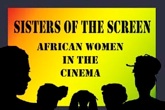"African women in the cinema" is not a monolith. Ngozi Onwurah even asserts that there needs to be more distinctions made between the disparate technologies, locations, and conditions in which African women work. There is, nonetheless, an exciting phenomenon that is emerging. Women from every region of Africa are using the diverse mediums of film, video, television and new media to produce feature, short, documentary and animation films, which are shown in movie houses, on television, at film festivals, at ciné-clubs and through the Internet. While they come to cinema along different paths, for different reasons, and at different moments, they share a common goal: to bring images to the screen.
The compilation of conversations brings together a collective voice of women of Africa from the diverse areas of cinema. It reflects the multi-faceted lives of women throughout the continent and extends to the Diaspora to focus on women who connect to Africa in their film work and cinematic practices. The representation of women in this collection spans all regions of Africa-north, west, east, central, and south. Though not exhaustive in its inclusion of all women in this arena, it is representative of the concerns, problems, histories, and futures of women of Africa who share the media as a common interest.
Sisters of the Screen covers a continuum of experiences: from the pioneer women to women film students who are making their debut in the film arena. Producers, film critics, and organizers are an integral part of the filmmaking process and their perspectives add an important dialogue to the conversation. Actresses, the visible subjects on the screen, voice their thoughts about African cinema and their role in the larger context of visual representation, culture, and society.
The interviews that make up Sisters of the Screen show the wide spectrum of experiences that shape the cinema of African women, as each adds her brick, in the words of Valerie Kaboré. Some share their journey along the path to cinema, others reflect on personal feelings around identity and its influence on their work. Some focus on the themes of their work, which span the personal to the political. Their films probe intimate and personal issues around sexuality, women's responses to male infidelity, conjugal violence, and forced marriages. The films also examine societal laws and statutes that deny women's personal, legal, and human rights. They also probe broader political concerns of democracy and free elections, and the consequences of civil war and its devastating effect on women and children. Some women talk about their direct involvement in national liberation struggles and the importance of raising consciousness around AIDS and other health issues, as well as women's literacy and education. Still others contemplate their role as communicator and catalyst for change, stressing the need for women to organize among themselves and come together as a collective body to realize their objectives. As their diverse experiences converge under their common interest in cinema, the thread that weaves their voices together is their commitment to "visualizing herstories."




© Beti Ellerson 2004-2023. Centre for the Study and Research of African Women in Cinema | Centre pour l'étude et la recherche des femmes africaines dans le cinéma


